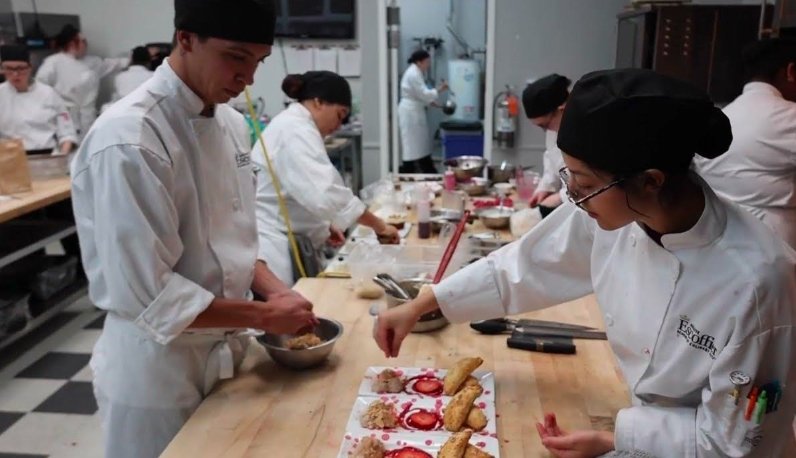Two young Scottish chefs, Kaitlyn McGibbon and Ben Smith, just wrapped up a week of hands on training at the Auguste Escoffier School of Culinary Arts in Boulder, Colorado. This chance came through the 2025 HIT Scotland scholarship, a program backed by partners like Gecko Hospitality and Escoffier Global Solutions, aimed at boosting skills in sustainable cooking and global techniques.
The HIT Scotland Scholarship Journey
The scholarship targets rising stars in Scotlands hospitality world. It picks chefs with real world experience to send them abroad for top notch learning. This year, McGibbon from Hazel restaurant in Glasgow and Smith from Cameron House Hotel near Loch Lomond got the nod. Both are just 21, but they already hold chef de partie roles, showing promise in busy kitchens.
This program runs every year to help Scottish talent keep up with worldwide trends. Organizers say it builds bridges between local scenes and international ones. For these chefs, it meant flying over 7000 miles for a five day deep dive starting September 8, 2025. They came back as Escoffier Ambassadors, ready to share what they learned.
Experts point out that such exchanges spark fresh ideas in home countries. Scotland has seen a rise in these kinds of initiatives lately, tying into bigger pushes for better training in the food sector.

Hands On Skills in the Kitchen
During their stay, the chefs jumped into intense sessions led by Escoffier pros. They focused on pastry work, where they practiced delicate doughs and fillings to get that perfect texture. Plating came next, teaching them how to make dishes look as good as they taste, a key for high end spots.
Advanced butchery rounded out the technical side. They learned precise cuts and ways to use every part of the meat, cutting waste and boosting flavor. The schools approach mixes old school methods with new tools, giving a full view of modern cooking.
One session stood out for its real life feel. In kitchen labs, they cooked under pressure, mimicking busy service times. This built their speed and confidence, skills that will help back home.
Here are some key skills they picked up:
- Pastry techniques for flaky croissants and tarts
- Plating artistry to elevate simple ingredients
- Butchery basics for sustainable meat prep
- Kitchen lab efficiency for team based cooking
Dive into Boulders Farm to Table World
Boulders food culture shines through its farm to table focus, and the chefs got a front row seat. They visited Black Cat Farm, a spot known for organic growing and eco friendly ways. There, they harvested veggies right from the soil, feeling the dirt and seeing how fresh picks change recipes.
This hands on part opened their eyes to sourcing ethics. They talked with farmers about soil health and why local beats imported for taste and the planet. Back in the kitchen, they turned that harvest into meals, linking field work to plate.
Boulder leads in this movement, with many eateries tying into nearby farms. It draws food lovers from everywhere, boosting the local economy. For the Scottish pair, it was a shift from their usual setups, where supply chains differ.
Boosting Scotlands Food Scene
Back in Scotland, these new tricks could shake up local menus. With culinary tourism on the rise, places like Glasgow and Loch Lomond spots stand to gain. Travelers seek out fresh, story rich meals, and farm to table fits that bill.
Recent trends show Scotland pushing sustainable eats. Events like Edinburgh Food 2025 mix tradition with new twists, drawing crowds. This training adds to that, as chefs like McGibbon and Smith bring Boulder ideas home. It might mean more spots offering hyper local dishes, using Scottish produce in smart ways.
Think about it: a chef trained in advanced plating could turn a simple haggis into a visual stunner. Or butchery know how might cut costs while keeping quality high. Overall, it strengthens the industry, creating jobs and keeping talent local.
To see the differences clearly, check this table comparing key aspects:
| Aspect | Scottish Culinary Practices | Boulder Farm to Table Style |
|---|---|---|
| Sourcing Ingredients | Often regional suppliers, focus on seafood and meats | Direct from local farms, emphasis on seasonal veggies |
| Sustainability | Growing interest in local, but varied adoption | Core principle, with farm visits and zero waste goals |
| Training Focus | Traditional techniques with modern updates | Hands on immersion in ethics and innovation |
| Tourism Impact | Draws for whisky and classic dishes | Attracts foodies for fresh, story driven experiences |
Why Travelers Should Care
For anyone planning a trip to Scotland, this news spells exciting changes. Culinary trips are hot in 2025, with folks chasing immersive food adventures. Trained chefs mean better options at hotels and restaurants, blending Scottish roots with global flair.
Boulders influence could inspire more eco tours, like farm visits in the Highlands. It ties into trends like luxury dining and biohacking through healthy eats. Travelers get authentic tastes that support local farmers, making visits more meaningful.
Plus, it promotes cross ocean links. Maybe next, Scottish spots host Boulder chefs, creating exchange menus. This builds a web of experiences that pull in more visitors, from food buffs to casual explorers.
In the end, programs like this HIT scholarship show how training lifts everyone. Share your thoughts on Scottish food trends in the comments below, and pass this along to friends who love travel eats.


















